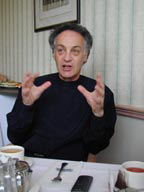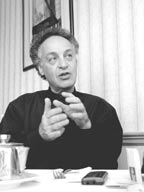Yoav Talmi - The Knight of the Rose by Lucie Renaud
/ October 2, 2002
Version française...
photo: Russell Proulx
Whether you're a Quebec City resident or merely a
tourist who likes walking or running, you may have unknowingly passed Yoav Talmi
standing meditatively in front of a clump of rosebushes in the Jeanne d'Arc
Gardens on the Plains of Abraham. The conductor of the Quebec Symphony Orchestra
is a man who thinks it worth his while to stop and smell the roses. In fact, he
has an unusual passion for horticulture, a passion that, despite a very full
timetable on more than one continent (he is also the maestro of the Hamburg
Symphony), makes him take time for these blushing beauties during his daily
walk. He has cultivated this love of flowers since his childhood years on an
Israeli kibbutz, where he had the delicate task of pruning roses and taking
cuttings for propagation. The terrace of his Tel Aviv apartment is equipped with
a hi-tech, automated watering and fertilizing system so that he can enjoy his
beds of roses when passing through.
 Talmi has another devouring
passion--one that dates from his adoles-cence: the orchestral repertoire. "I
found it more satisfying to listen to a symphony than to play a sonata," he
explains. "The rich sound and colours of the orchestra were far more
exhilarating than simply playing the piano." At the age of eighteen he left
Israel to attend the prestigious Juilliard School of Music in New York. He also
followed many summer courses with the greatest conductors of the time--Walter
Susskind, Eric Leinsdorf, and Leonard Bernstein. "I was lucky to have learned
how to bring the music across rather than just conducting technique," he says.
After finishing his studies, he went back to Israel, where he was offered some
sixty concerts a year. Three years into this hectic schedule he began to have
doubts and decided to take a sabbatical. He left for London with his wife, the
flutist Er'ella Talmi, and his son (then very young, but now a composer of music
for films). The couple taught in order to put bread on the table. The students
were a mixed bag, some more talented than others--"a real torture" groans Talmi.
There were compensations, nevertheless. Each morning he would slip into Festival
Hall to listen to rehearsals by the greatest conductors of the day. "I learned
so much during that year, especially how the conductor can successfully transmit
his ideas to the musicians without scaring them, and how to get results through
the love of their work rather than fear. I learned more in that year than in all
my years of study." Talmi has another devouring
passion--one that dates from his adoles-cence: the orchestral repertoire. "I
found it more satisfying to listen to a symphony than to play a sonata," he
explains. "The rich sound and colours of the orchestra were far more
exhilarating than simply playing the piano." At the age of eighteen he left
Israel to attend the prestigious Juilliard School of Music in New York. He also
followed many summer courses with the greatest conductors of the time--Walter
Susskind, Eric Leinsdorf, and Leonard Bernstein. "I was lucky to have learned
how to bring the music across rather than just conducting technique," he says.
After finishing his studies, he went back to Israel, where he was offered some
sixty concerts a year. Three years into this hectic schedule he began to have
doubts and decided to take a sabbatical. He left for London with his wife, the
flutist Er'ella Talmi, and his son (then very young, but now a composer of music
for films). The couple taught in order to put bread on the table. The students
were a mixed bag, some more talented than others--"a real torture" groans Talmi.
There were compensations, nevertheless. Each morning he would slip into Festival
Hall to listen to rehearsals by the greatest conductors of the day. "I learned
so much during that year, especially how the conductor can successfully transmit
his ideas to the musicians without scaring them, and how to get results through
the love of their work rather than fear. I learned more in that year than in all
my years of study."
He returned to his work, totally
refreshed and ready to take on the major challenges. For some years he was
musical director of the Israel Chamber Orchestra, filled the same post with the
Arnhem Philharmonic between 1974 and 1980, became principal guest conductor of
the Munich Philharmonic between 1979 and 1980, and conducted the Israel New
Opera Company from 1984 to 1988. From 1989 to 1996 he was musical director of
the San Diego Symphony, which he transformed into a world class ensemble. In
1998 he applied for the conductorship of the Quebec Symphony.
Making changes
From the start he began to
implement subtle changes. "I was given an orchestra with a number of
extraordinary qualities, the most striking of which was certainly the desire to
surpass what it had already achieved," says Talmi. "Some sections of the
orchestra were a little weak, but I'm proud to say today, after three years with
the orchestra, that this is now a thing of the past. You have to be very patient
and work hard, but I couldn't have done it if the orchestra hadn't had the
desire to work. I've had the chance to work with the best orchestras in the
world. Every note is in the right place, but often their hearts aren't in it.
Then you find yourself working with an orchestra that may seem less
accomplished, if you take every player individually, but whose members are
sitting on the edge of their chairs and giving their all. The tension level
becomes so great during concerts that it leaps into the hall."
Preparation is a team thing, and Talmi knows just where to direct his energy
when it's time to galvanize the troops. "I rarely need more than five rehearsals
with the orchestra to prepare a program, whether it's a Mahler symphony that the
musicians have never played before, or a Canadian original. The musicians know
how to prepare before the first rehearsal, when we go through it for the first
time together--a prima vista, so that they grasp the essence of the
work. After this first reading we work in sections, in a very open
way." 
Darren Lowe, the symphony's
first violin, doesn't stint on praise. "He's an all-round conductor," says Lowe.
"He's an excellent musician and also has the qualities needed to gain the
musicians' respect when he's conducting. He studies the score thoroughly and
knows how to communicate his ideas forcefully and effectively." Jean-Louis
Rousseau, a violinist with the orchestra since 1954, has seen a number of
conductors come and go. He says that he finds Talmi deeply human, that the
conductor knows how to get what he wants from the orchestra with the minimum
number of gestures. "He knows what it's like to be a member of the orchestra,"
says Rousseau (Talmi was an orchestra pianist at one time). "That's why he knows
how to ask for what the orchestra is capable of performing. He rehearses things
in depth and is sensitive to the balance of sound. Above all, he is profoundly
human, very responsive."
This responsiveness makes Talmi
stand out from the general run of egocentric maestros who get what they want by
way of threats. Says Talmi, "I treat my musicians as colleagues. I never tap
anyone on the head. That's not my style. If a conductor says to a musician,
'You're always pushing the tempo,' the musician will probably have trouble
swallowing the criticism. He could also say, 'Can we try this section once
again, making sure the tempo stays the same throughout and not getting ahead of
ourselves?' I say the same thing in an entirely different way, and the musician
understands it differently. I try to create an atmosphere during rehearsals that
makes the musicians feel involved. I think that if you succeed in creating this
atmosphere, the musicians will be all the more motivated. On concert nights,
what we've worked on will be in their fingers, minds, and hearts. I don't want
to be a traffic cop. One of the reasons I memorize my scores is that it gives me
a chance to close my eyes and concentrate on the atmosphere of the work. Of
course, I look the musicians in the eye to underscore when they're to come in,
but I feel free to let them know, intuitively, that they can forget what we've
done so far and let themselves go. The music must get off the ground, be alive
in the air. It's no longer work: it has become an art."
Darren Lowe, emphasizing Talmi's charisma and his role as a catalyst, says,
"He lets the musicians express themselves through their instrument, lets them
bring out the best." Anne DeBlois, a volunteer and a member of the symphony
choir, says of her first meeting with Talmi, "When I joined the Quebec Symphony
choir in June, 2002, I didn't know Mr. Talmi at all. We first met in a work
environment. What surprised me was his quiet, very serious manner. He didn't
raise his voice or say anything that wasn't necessary. He was serious when he
had to be and congratulated us when he was satisfied. I'll always remember the
few moments after Verdi's Requiem in May, 2001. I wanted to congratulate him, as
was natural, when to my surprise it was he who, on seeing me, praised my
work--and I was just a simple choir member hidden in the five rows of singers at
the back of the stage during concerts!"
Talmi's influence is felt at all levels of the organization. He personally
supervises the hiring of new musicians and is involved as much in the season's
programming as in the choice of soloists. His ability to take the long-term view
helps him define the orchestra's character. For example, soon after his arrival,
he suggested that the orchestra do all the Bruckner symphonies--works that it
had never dared take on. "People will know Quebec City as Bruckner City," he
said slyly, smiling. The orchestra is now doing the Mahler symphonies, this year
the Second, for which Talmi admits having "a tremendous affinity." This year the
orchestra will also present the Brahms Requiem, a new endeavour, after
having done the requiems of Fauré, Verdi, and Mozart. This tour de force will display the orchestra's
newly-acquired skills: a warmer, fuller, more fluid tone, better ensemble
playing, and an adroit balance among the various orchestral sections.
 Talmi moves seamlessly from
conductor to negotiator, taking a firm stand with the members of the board to
persuade them to combine his tastes with those of the audience. He seems to have
a charmed relationship with the public. The orchestra throws its net wide and
offers "light" concerts (extracts from the season) that sell well in shopping
centres. Talmi has also launched a very popular series of family concerts that
mix theatre arts with symphonic music. Before concerts, children who visit the
"musical zoo" can look at the orchestra instruments. Talmi moves seamlessly from
conductor to negotiator, taking a firm stand with the members of the board to
persuade them to combine his tastes with those of the audience. He seems to have
a charmed relationship with the public. The orchestra throws its net wide and
offers "light" concerts (extracts from the season) that sell well in shopping
centres. Talmi has also launched a very popular series of family concerts that
mix theatre arts with symphonic music. Before concerts, children who visit the
"musical zoo" can look at the orchestra instruments.
The conductor has a long reach: his idea is to get the whole community
implicated in the orchestra's centenary celebrations. For those with a sense of
nostalgia, a "1900" ball will be held on October 5 ($100 a ticket, of which $60
is tax-deductible). "I want people to be proud of being involved in celebrating
the symphony's centenary," he states. Also on the program: the launch of an
abundantly illustrated history of the Quebec Symphony (we'll review it in our
next issue),
the release of two new CDs, and an interactive exhibit at the Museum of
Civilization about the symphonic world and the elusive figure of the conductor
(from October 16, 2002, to September 2, 2003). The orchestra will also make its
first Canada-wide tour, stopping in Vancouver, Banff, Regina, Winnipeg, Toronto,
Ottawa, and Montreal. Talmi makes no bones about the fact that he hopes the tour
will have a snowball effect and open doors for the orchestra. "The orchestra
will reach greater heights than ever before," Darren Lowe believes.
Talmi's head may be in the
clouds, but his feet are firmly on the ground and on the fertile soil of the Old
Capital. There is no doubt he will leave his mark on the city that welcomed him
with open arms a few years ago. Like a diligent gardener, he'll do it through
rehearsals, concerts and recordings, sowing the seed for a new series of
concerts, grafting onto it a concert with young professionals from the
Conservatory or Laval University, certainly enriching the lives of an
ever-growing audience. "Why do we like him so much?" wonders Anne DeBlois. "His
musical gifts account for it in large part, and certainly his contribution to
the city's cultural life. But perhaps more than anything, we like him because he
likes working with us and trusts us. And it seems we return the compliment.
Maybe it's also because he has the good of our orchestra at heart." Does not the
rose bloom so sweetly because of the time spent in its care?
[Translated by Jane
Brierley]
Version française... |
|


